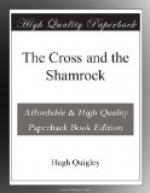“Thank you, my child,” said the priest, reaching him his hand.
“Forgive me, sir,” said the poor youth; “I can’t but weep, ’tis so long since I saw a priest or heard mass.”
There was not a dry eye in the crowd as the young lad clung to the priest’s hand, embracing it, and crying aloud, “O my uncle! my uncle!”
“Take him into the shanty and calm him a little,” said the stalwart missionary. “Poor little fellow! poor child! poor child!”
“O, God help the orphan!” said Mrs. Murphy again, fearing she had not touched his reverence’s heart. “It would be the charity of God to do something for them. The men would be all willing to subscribe.”
“We will do all we can,” said his reverence. “God will provide for them, if they be what you represent. Meet me here to-morrow, at six o’clock. We will have mass and confessions here in the shanty, as we could procure no better place. Give word around through the entire neighborhood. Good by for the present,” said he, moving along towards the village of S——.
“God speed your reverence,” answered a hundred voices, as they returned the adieu.
This was the first night since the death of his beloved mother, and that was over two years, that the slightest ray of hope penetrated the burdened but confiding soul of Paul. For himself he did not much care. He could have escaped any day, and repudiated the iniquitous contract by which the villanous poormaster had sold him and his brethren; but what was to become of his younger sister and brothers? He knew how to plough, mow, cradle, and farm it, as well as any body of his age. He knew how to read, count, write, and even defend his religion, against all opponents, as he did last winter at the Lyceum; but what was to become of Bridget, Patrick, and little Eugene, who had yet many years to serve? This was what puzzled him. But now the priest had come for the first time to this remote region, and he knew what to do, and would not desert the orphan, for no priest ever had done so. He felt there was to be now a change, and he felt assured that it would be for his good. “Thank God,” said he, “I saw the priest at last. I return thee thanks, my God, and thee, my mother in heaven, now my only mother, and I thank all the heavenly citizens and all heaven, for this dawn of hope that I feel in my soul. O Lord, thy will be done on earth as it is in heaven.”
Fervent and pious were the prayers offered to God on this night by Paul, as he thanked him for having seen one in whom he could confide as a friend, as well as because he was preparing to go to his religious duties on the morrow. Let it not be said that it was superstition in Paul to thank God so fervently for having permitted him once more to converse with his priest. What can be imagined a more worthy cause for thanksgiving than the meeting with a true friend? What better gift can we receive from God than a friend? And who ever, in need, has failed to find the good priest a friend in all emergencies?




